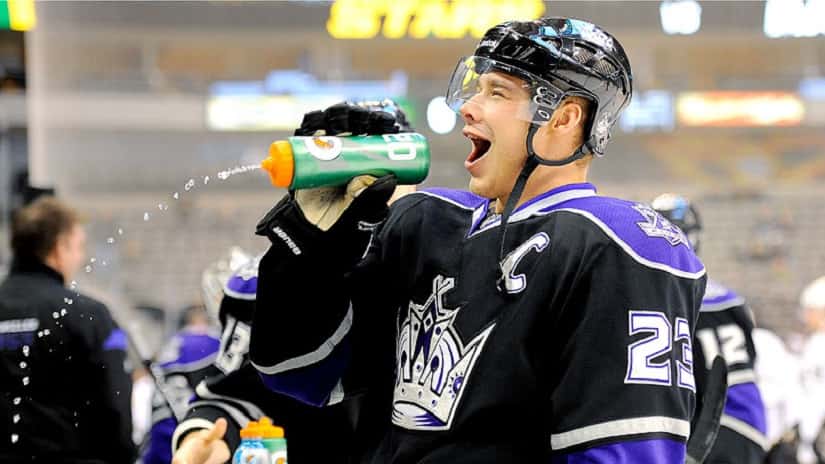
What’s the number one nutrient you should be fueling your body with?
Iron? Calcium? How about some of that salty magnesium stuff?
Wrong, bucko—it’s water.
Even though we don’t tend to think of water as being part of our nutrition, per se, it’s importance is hard to overstate.
It powers cellular processes in the body, it’s a main ingredient in blood (heard that stuff is important!), and as we all know from our time working out in a warmer-than-regulation gym, helps cool us down by evaporating from the skin.
From an early age we have been told over and over again the importance of staying properly hydrated. The Gatorade water bottle has been a familiar part of the training experience since most of us first laced up a swim suit or sneakers.
And yet, as some painfully fascinating research recently showed, even elite level athletes aren’t staying on top of their hydration needs.
Here is everything athletes need to know about water and staying hydrated.
What are the effects of dehydration on athletes?
Most of us only think about water when we are thirsty. Or when it’s hot as balls outside and we went to splash some cold water on our faces. Or when our sister drained the hot water tank so now your hot shower turned into a lukewarm shower.
But there is no getting around to how fundamental it is to athletic performance and life itself. Because we can’t harness our inner camel and store vast amounts of water we need to be continually replenishing and restoring our water levels.
When we aren’t properly hydrated some pretty gnarly stuff happens:
- General decline in performance. As athletes this is the biggie. We live and die by our ability to train and race like champs. Dehydration causes us to start to see performance declines when we approach a 1-3% loss in body weight from sweat.
- We are more likely to experience cramps and headaches. The hardest set, the heaviest weight, and the longest sprint sesh doesn’t hold a candle to the sharp and unrelenting agony of a hamstring or calf cramp. While the exact cause behind muscle cramps isn’t completely clear (it’s thought to be hydration or general muscle fatigue), we all know how debilitating they can be. For those athletes who get extra sweaty the importance of staying hydrated becomes even more paramount.
- Your efforts feel more efforty. Your regular workout routine will feel more difficult than usual. High grade efforts in your practices will require more effort. Rate of perceived effort goes up. You know that sluggish feeling you experience when you can’t quite get into the swing of things during your workout? That could very well be dehydration. Numerous studies (here’s just one starting at just a 1.6% drop of body weight) have shown that muscle endurance is negatively impacted by dehydration.
- It makes you dumb and tired. If your workout starts to feel more difficult, and things feel generally more laborious, cognitive skills are sure to follow suite. One study found that when a group of men were dehydrated to the point of losing up to 2.8% of their body mass from sweating that cognitive abilities (short term memory, perceptive discrimination) decreased. Even 3.5 hours after getting rehydrated they still felt sluggish.
- Increase in core temperature. Ever trained in a gym that was really hot? Or swam laps in a pool that was noticeably warmer than usual? If so, you probably noticed that you got gassed a lot faster. Being properly hydrated helps keep your core temp at a manageable level and keep you from overheating. As research has shown, when we start getting dehydrated our bodies go into survival mode, hoarding fluids and slowing sweat rate and the flow of blood to your skin.
- You are slower to recover. One of the most underrated aspects to high performance, uh, performing is the ability to recover. Full time athletes are either training their asses off in the gym or they are doing everything they can to recover for the next thrashing at practice. In a study published by the ISSN athletes who worked out for 90 minutes either drank a sports drink before and after their practice while others didn’t. While the performance metrics didn’t statistically differ, the nervous system recovery showed signs of recovering much faster with the ingestion of the sports dranks.
Alrighty, well that is some heavy stuff.
But thankfully, staying hydrated isn’t really that tough. All it takes is a little bit of focus and planning on keeping your hydration levels topped up.
How to Tell You Are Dehydrated
For most athletes the problem with hydration is that it isn’t always super apparent that we are dehydrated. Short of being so thirsty that we are tempted to gulp down chlorinated pool water or are peeing fluorescent orange we don’t generally notice we are hypohydrated.
One study took a group of NCAA athletes across various sports and did spot checks before some of their practices to determine their hydration levels. The results were not great:
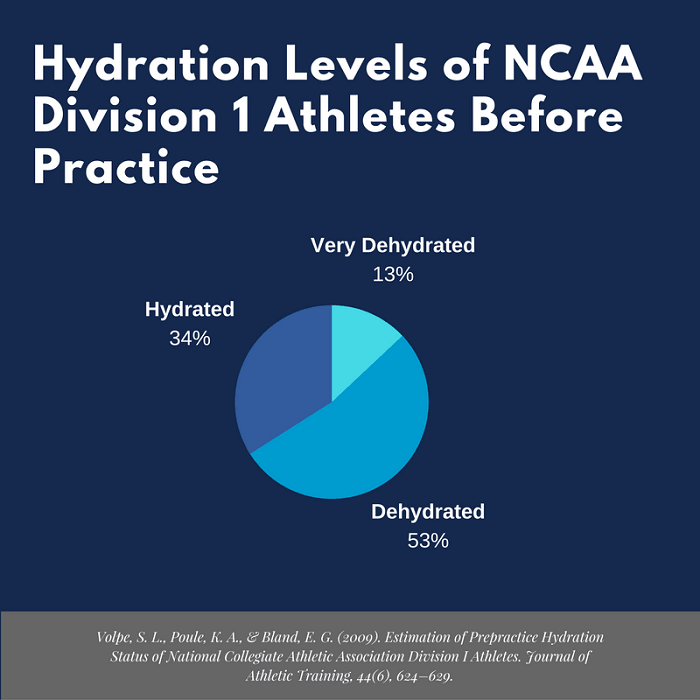
Yowza.
So how do you know if you are dehydrated? Below is a fun little chart that will give you a good idea of where you stand in terms of dehydration.
If your pee is hitting the shade of #8 you have much larger problems than being properly hydrated to workout, and should probably see a doctor. Just sayin’.
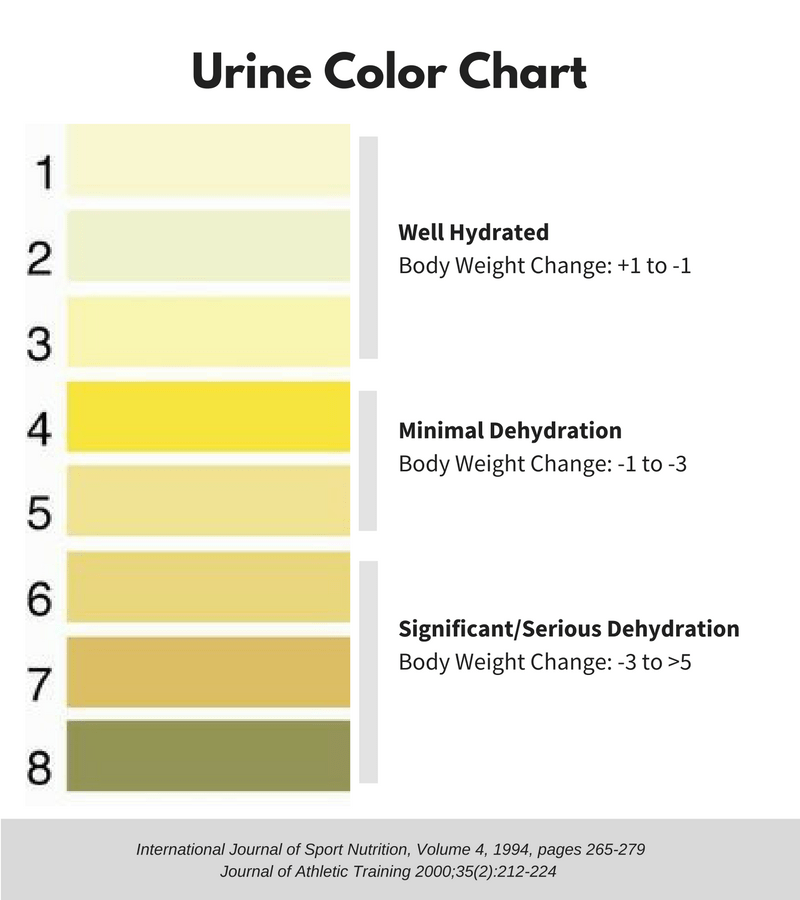
How to Properly Hydrate
There are some pretty basic rules to follow when it comes to staying hydrated over the course of the day.
It comes down to consistency (just like anything else in life), and remembering to take sips and sips and sips as you go about your day, and especially in preparation for your big nasty workout.
Drink a glass of water when you wake up.
My water bottles litter my house—I have about a half dozen of them on various tables, desks, and on the couch (much to my girlfriend’s chagrin), and three of them within arm’s reach as I type this at my desk.
Without fail, however, is positioning one bedside.
There are two reasons for this: one, I usually wake up with a mud puddle-like taste in my mouth in the mornings and find that drinking a couple gulps of water helps flush it down, and secondly, we lose a butt-ton of water over the course of the night.
How much?
Estimates vary, often over a pound. Endlessly breathing out little wisps of water vapor over the course of the night ends up sapping our fluid levels. Weigh yourself before sleep and when you wake up and you’ll see the difference for yourself.
Drink water on your rest days too.
I’ll admit, I’m guilty of this on occasion. On days off my water bottle is a little less at-my-side than usual. Even if you aren’t working out you are still losing water.
By the act of sweating and breathing vapor out of our mouth-holes we are losing around 2.5 cups of sweat over the course of the day. And that’s just from breathing and trying to work up the nerves to talk to that pretty girl at the gym. (Don’t—she’s working out, man.)
Keep a water bottle on your person.
Going to school? Bring a water bottle. Going to work? Bring a water bottle. Going to practice? You know the answer.
Be a 24-hour athlete and have your water bottle on you at all times. Just having it there with you will be a strong reminder to stay on point with your fluid intake. (We eat–and drink!–what we see, after all.)
Top up your hydration before practice.
Often I see athletes crush a ton of water as they are about to start working out, realizing that they have been neglecting their fluid levels for most of the day.
In a recent guide that I did with NCAA Division 1 nutritionists and dietitians covering nutrition tips for collegiate athletes one of the experts—himself a former WBO World Junior Welterweight Champion—noted that hydration was usually the first thing screwing up even a fit athlete’s training and competition.
Chris Algieri is the sports nutritionist at Stony Brook University where he works with their athletes to insure that they are ready to rock and roll when it comes to being properly fed and hydrated.
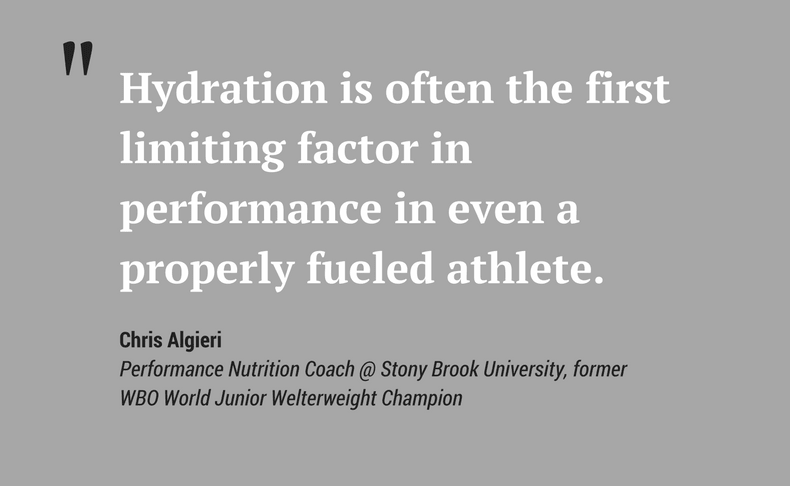
One of his pieces of advice for tackling hydration levels is to “top off” fluid levels a couple hours before your practice with 16-20 ounces of water. This is helpful so that you aren’t crushing pints of water just as about as you are about to hit your workout, while leaving you feeling bloated and water-logged.
Top up on water while you are exercising.
Typically athletes will only drink about 2/3 of the water compared to how much they are sweating.
The reasons for this are varied:
- Competition/training breaks don’t allow for adequate time to drink water. During intense workouts this is a common scenario–you are too out of breath and winded to think about drinking anything.
- Accessibility. Unless you have a water bottle on you it’s not always easy to get at. Going for a run outdoors, for instance. Or a water fountain that is nowhere near where you are training in the gym.
This goes back to having your water bottle on you–of making it part and parcel of your very workout.
So how much water should you try to be consuming while you are working out?
“Drink 6-8 ounces of water for every 15-20 minutes of activity,” adds Algieri.
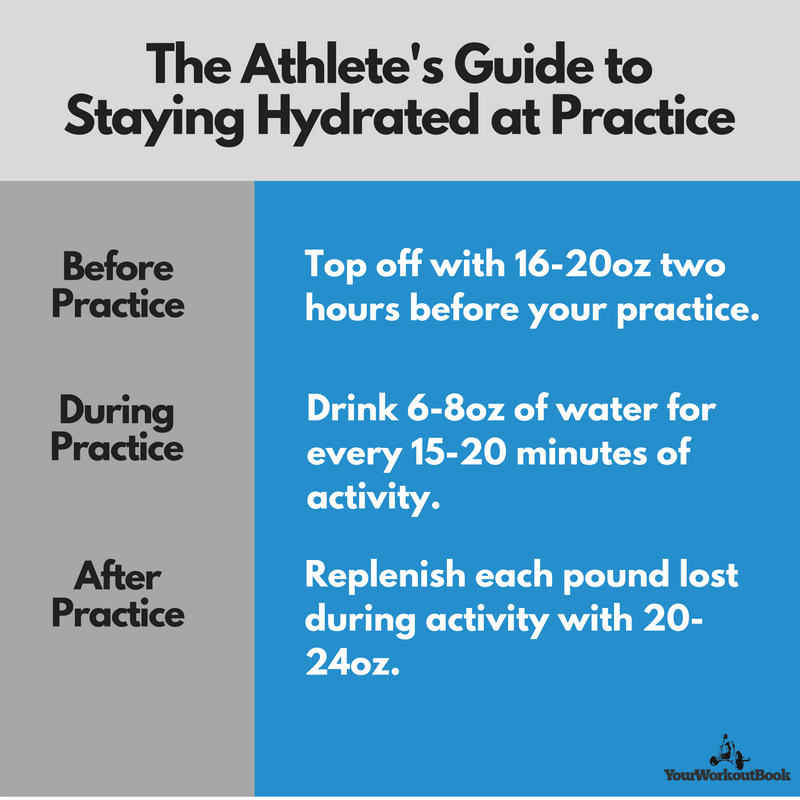
Water vs. Sports Drinks
The sport drink, something invented during the 1960s for University of Florida Gator athletes (hence why it is called Gatorade), has become a marketing juggernaut since then, pervasive on sidelines and vending machines worldwide.
But how effective is it in effecting hydration levels? Well, it depends on how long you are working out.
Strategically hydrate according to your workout length:
- One hour or less: You can stick to plain, old, boring (and free) water. There is little to no difference between drinking a sports drink and consuming water over the course of workouts that last less than one hour.
- More than one hour: During those workouts where you are pushing it to the limit for longer than 60 minutes throw some carbohydrates and electrolytes into the water bottle. Aim for 30-60g per hour to help power your muscles and pump the brakes on fatigue. Additionally, sodium as part of your drinky mix is suggested by the American College of Sports Medicine as it can help promote fluid retention (so you’re not peeing every nine seconds).
There is another benefit to sports drinks that don’t really have anything to do with hydration, but should be mentioned here.
The original study, done about a decade ago, found that when athletes doing a one hour time trial on a bike performed a quick mouth rinse with a carb-loaded drink performance improved by 2-3%.
Essentially what is happening is that we are fooling the brain into believing that more energy is on the way, even though our bodies don’t necessarily need it.
MRI studies have shown that our brain lights up whenever we have some carbs in our mouth, which goes to show that a lot of the time our performance is quite literally in our head, and not due to actual muscle fatigue.
More recent research tried to see if the length of time that the mouth rinse was done had an effect. As you can see in the chart below, a 10s mouth rinse out-performed a 5s rinse, and both significantly out-paced the placebo (a water rinse).
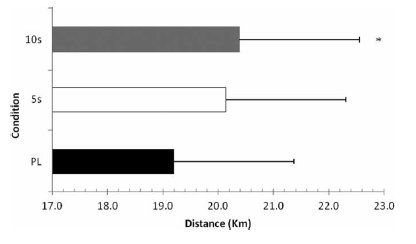
The athletes not only biked further, but did so with a lower rate of perceived effort.
The Next Step
In terms of increasing performance, there are fewer ways that are easier and cheaper than staying hydrated.
All it takes is consistency over the course of your day and during your training in order to reap the benefits of faster recovery, fewer cramps/headaches, increased endurance, and supercharged performances.
In sum, here’s what you can do to make proper hydration a part of your daily routine:
- Have a big glass of water first thing in the AM.
- Carry a water bottle around with you.
- Crush 16-20oz of water two hours before your workouts.
- Drink 6-8oz for every 20 minutes of exercise.
- Water for workouts <1 hour; Carb/electrolyte mix >1 hour.
- Replenish after practice with 20-24oz of water per pound lost.
See Also:
- 5 Proven Benefits of Using a Foam Roller
- Why Athletes Shouldn’t Skip Breakfast. You’ve always been told it’s the most important meal of the day. Here is why this continues to be the case.